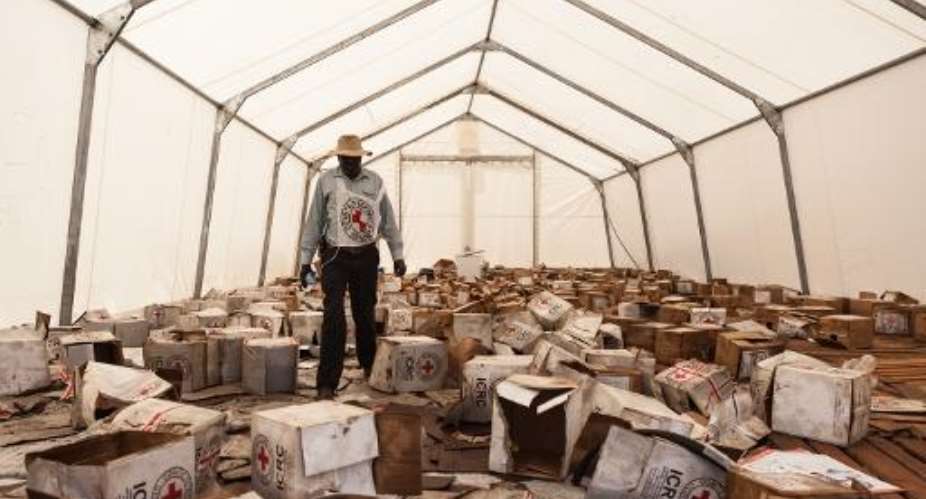Juba (AFP) - Residents of Leer, a South Sudan town targeted in a government offensive, have begun returning to their homes from the surrounding swamps where they had sought shelter, aid workers said Monday.
The International Committee of the Red Cross (ICRC) returned to Leer at the weekend for the first time since being forced to pull out some of its staff and suspend operations as government forces approached a week ago, triggering an exodus by the town's 100,000 residents.
The United Nations said the ongoing offensive has been characterised by attacks on civilians, rape, mutilation and the forced recruitment of child soldiers. Recent fighting has been among the worst in South Sudan's 17-month long civil war, which began when President Salva Kiir accused his former deputy Riek Machar of planning a coup.
In Leer, the birthplace of Machar, ICRC aid workers found all four of their vehicles stolen and their humanitarian compound looted, including all the furniture.
"The situation here in Leer is extremely serious. People are only just beginning to come back," said Daniel Littlejohn-Carrillo, an ICRC official who led the return mission to Leer.
"We know of several casualties of violence in the villages around here. The needs –- in terms of water, food, other forms of health care and shelter -– are dire, and we expect them to grow substantially fairly quickly," he said.
Residents are slowly returning to Leer, where livelihoods have been destroyed and several houses burnt, according to ICRC.
The condition of the town's hospital, run by medical charity Doctors Without Borders (MSF), was unknown. During a previous government offensive earlier last year the hospital was ransacked and partly destroyed by fire.
Among the fearful residents making their first cautious forays into town was Nyajiok Ruai who fled Leer with her 10 children aged between seven months and 12 years.
She told the ICRC that her family had slept in the open, drank bad water, had little food and were unprotected against malarial mosquitoes. When she returned to Leer she discovered that her home, made of mud and straw, and all its contents had been burnt down.
Another resident, John Jal Riak, 23, said he walked for eight hours before finding somewhere he felt safe enough to sleep, outside among the "tall grass" where people searched for water lilies and coconuts to eat. "The community is really suffering," said Riak.





 Elisu By-election: "If you call yourself a man, boo Chairman Wontumi again" — Bo...
Elisu By-election: "If you call yourself a man, boo Chairman Wontumi again" — Bo...
 Fuel tanker driver escapes with his life after tanker goes up in flames near Suh...
Fuel tanker driver escapes with his life after tanker goes up in flames near Suh...
 Uniform change: ‘Blue and white are brighter colours’ — Kwasi Kwarteng explains ...
Uniform change: ‘Blue and white are brighter colours’ — Kwasi Kwarteng explains ...
 MoE not changing all public basic school uniforms but only newly built ones — Kw...
MoE not changing all public basic school uniforms but only newly built ones — Kw...
 We’re only painting new public basic schools blue and white – Dr. Adutwum clarif...
We’re only painting new public basic schools blue and white – Dr. Adutwum clarif...
 Bawumia has lost confidence in his own govt’s economic credentials – Beatrice An...
Bawumia has lost confidence in his own govt’s economic credentials – Beatrice An...
 I fought WW2 at age 16 – WO1 Hammond shares At Memoir Launch
I fought WW2 at age 16 – WO1 Hammond shares At Memoir Launch
 GRA-SML deal: Regardless of what benefits have been accrued, the contract was aw...
GRA-SML deal: Regardless of what benefits have been accrued, the contract was aw...
 April 26: Cedi sells at GHS13.75 to $1, GHS13.18 on BoG interbank
April 26: Cedi sells at GHS13.75 to $1, GHS13.18 on BoG interbank
 Champion, promote the interest of women if you become Vice President – Prof. Gya...
Champion, promote the interest of women if you become Vice President – Prof. Gya...
